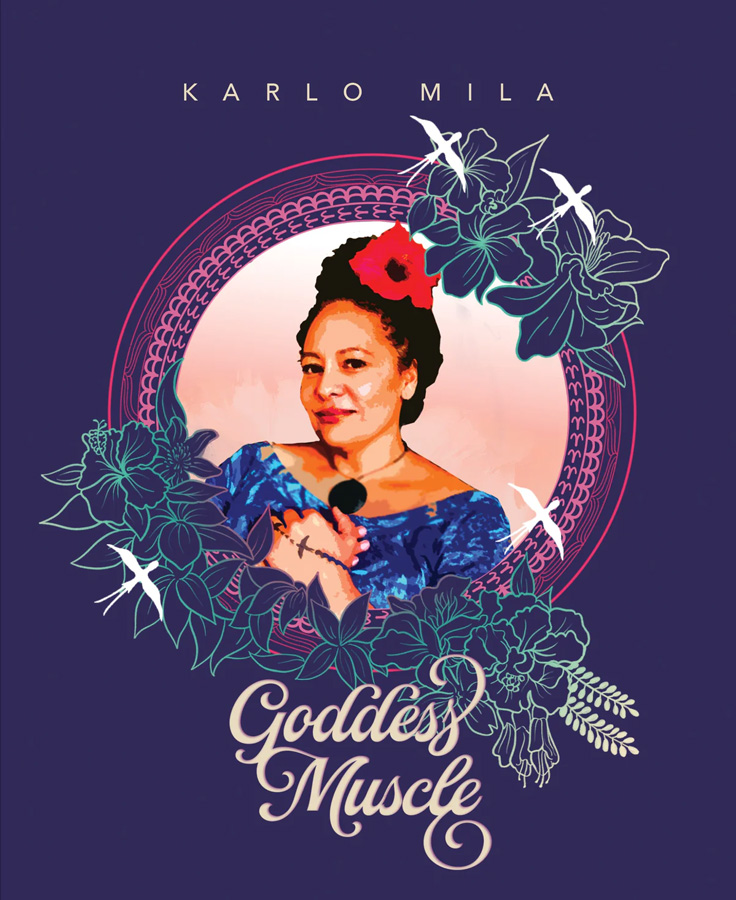I wonder what exactly a goddess muscle is. Do you know if you have it? Do I have one, buried deep down in a part of my body I’m yet to know? I wonder if, like intergenerational trauma, a goddess muscle and its memory is something which is inherited, an epigenetic configuration forming and reforming, again and again. Since reading Karlo Mila’s latest collection of poetry, I’ve been thinking about the premise of its title Goddess Muscle. Of the way muscles get stronger only through their repeated use and what this means in relation to being a goddess, and how this can be committed to muscle memory developed over a period of time.
Goddess Muscle, Mila’s third poetry collection, includes poems which range from being incredibly personal, charting the end of a marriage, to political commentary about events, such as the murder of Tamir Rice and at Ihumātao. Dreaming of an alternative possibility at Ihumātao where Jacinda might actually visit the whenua Mila writes, ‘I dream Jacinda truly felt/ that this history stinks like sewage/ as she drove into the shit-show’. It is littered with moments of introspection and pain, hope and healing. The collection as a whole, with its many sections, takes readers on a turbulent ride, weaving through many different experiences and modes of thinking – something to expect in a collection spanning over a decade of writing.
As well as being a poet, Karlo Mila is Programme Director of Mana Moana, Leadership New Zealand. The well-known Mana Moana programme uses Mila’s own postdoctoral research, which acknowledges the place of Indigenous language and ancestral knowledge in contemporary leadership contexts. This mode of operation, which centres Indigenous knowledge, similarly takes hold throughout the collection. Despite the collection’s varied themes, we are constantly reminded of Indigenous conceptions of the world in poems like ‘Tagaloa: The Order of Things’, ‘Papatūānuku’, Kūkaniloko’, ‘Te Korekore’, which act as anchor points, or moments of respite before being taken on another journey. Mila returns readers to the source, as the closing line of the collection reads, ‘All of us tributaries/ in the return/ to source.’
The poems written for others constitute a stunning thread of Goddess Muscle – people like Teresia Teaiwa, Epeli Hauʻofa, Jim Viviaere, Albert Wendt, her son Maka Toa and a poem commissioned by her Nana offer beautiful tributes to the people in and around her life and poetry. In some instances, they read like love letters, which place this work in an intellectual gafa or history, acknowledging those who inform Mila’s own thinking. For Teaiwa, Mila writes:
You are,
Maraea nailed it,
‘kaupapa as’
unafraid,
yet overburdened
with community service
The lighter moments are harder to come by, but when then they do, they offer welcome moments of humour, like in ‘Tūhoe Boys’ which reads:
Because you can lead a horse
to water,
but if you can force them to drink
they aren’t a Tūhoe boy.
The book in and of itself has a great materiality to it. The textured cover has a portrait of Mila mirroring the cover of her first collection Dream Fish Floating. Full colour is reserved for the cover; inside pages use flat planes of colour backgrounds with variously coloured text. Shades of blue plunge us into the ocean for tributes to Pacific scholars and writers, while blacks pull us into te pō or the darkness. On some pages the white text against colour can be a little difficult to read, but it’s an intriguing design feature of the collection, a helpful device to shift the reader quickly into the site of each poem.
You’ve written a lot of poems
he said.
Yes.
It’s how I turn mess
into tidy.
How I organise chaos
into clean.
It’s how I turn
self-harm,
into
black blade
on white page.
And it’s clear that Goddess Muscle turns Mila’s mess into tidy sections that roll through moments of intensity. If we think with this concept of the goddess muscle being something that strengthens with repetition, it’s not a stretch to say that Karlo Mila’s own goddess muscle comes through the repeated writing of poetry, repeated experiences, and repeated ceremonies of healing. At over 200 pages with poems, Mila has definitely been flexing her own goddess muscle. Some poems could have been shortened, but then I wonder if they would have been long enough to commit the memory to one’s muscle.
In a recent review of Tusiata Avia’s The Savage Coloniser Book, Selina Tusitala Marsh acknowledges that sometimes we need to go through our wounds and back through them several times. This sense of repetition, of knowing ones wounds so intimately that one can move beyond it to a space of healing, is the memory we commit to our muscle. For Mila that involves evoking the goddess muscle that has been built over the past 10 years of writing. In the end, it’s a collection about empowerment, of a voice that won’t dim for others, and a voice that beyond all else relies on its own Goddess Muscle through it all. This is a valuable collection, one that I will draw from for years to come.
This review was originally published on the Academy of NZ Literature site.



